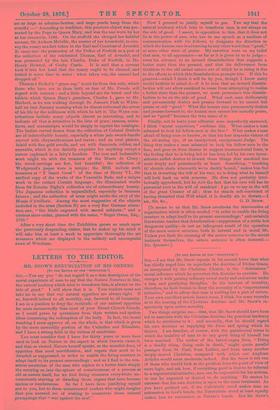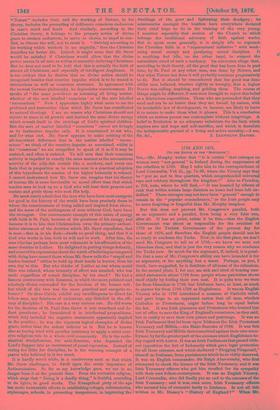[To THE EDITOR OF THE "SPECTATOR:']
Stn,—I see that Mr. Snow repeats in his second letter that what has chiefly urged him to repudiate the doctrine of Divine Grace, as interpreted by the Christian Church, is the " deleterious " moral influence which he perceives this doctrine to exercise. He charges it with putting ordinary moral study and endeavour under a ban, and paralysing discipline. In the interest of morality, therefore, he feels bound to deny the necessity of a "supernatural initiative," and to affirm that man is nothing but a part of nature. Your own excellent article leaves room, I think, for some remarks as to the bearing of the Christian doctrine and Mr. Snow's re- spectively upon active morality.
Two things surprise me,—first, that Mr. Snow should have been led to associate with the Christian doctrine the practical tendency which he attributes to it ; and secondly, that he should regard his own doctrine as supplying the force and spring which he desires. I am familiar, of course, with the paradoxical terms in which the inability of man to do any good thing of himself has been asserted. The author of the barrel-organ lines, "Doing is a deadly thing, doing ends in death," might quote parallel passages from St. Paul, from Luther, and from many another deeply-moved Christian, compared with which our Anglican Articles would seem moderate indeed. But Mr. Snow is not one of those who would look at the problem from the point of view of mere logic, and ask how, if everything good is thus to be referred to a supernatural initiative, man can be responsible for his actions, or can be expected or desired to do anything. He cannot be unaware that his own doctrine is open to the same treatment. As you have pointed out, if the Calvinistic creed makes man an automaton in God's hands, the Naturalistic creed at least equally makes him an automaton in Nature's hands. But Mr. Snow's " Nature " includes God, and the working of Nature, in his theory, includes the prompting of deliberate conscious endeavour in man's mind and heart. And similarly, according to the Christian theory, it belongs to. the primary action of divine grace to awaken endeavour, to move to choice, to impel to con-
flict, to liberate the will, not to crush it. " Striving according to
his working which worketh in me mightily," thus the Christian describes his better life. Indeed, it might seem that Mr. Snow would be satisfied if Christians would allow that the divine power moves in all men as well as in earnestly-believing Christians. But he does not need to be told that this is actually the faith of almost all Christians, and especially of intelligent Anglicans. It is too evident that he desires that no divine action should be recognised besides that creative impulse which is to be traced in unconscious as well as conscious creatures. In agreement with
the newest German philosophy, he depreciates consciousness. He speaks of " the same providence as actuating all living matter,
whether of the sort labelled ' conscious' or of the sort labelled
I unconscious.' " Now I appreciate highly what seem to me the profound and instructive ideas which Mr. Snow has contributed to natural theology. I see no reason why Christians should not rejoice to trace in all growth and instinct the same divine energy which reveals itself in the strivings of God's spiritual children. But the sort of matter labelled " conscious " cannot act livingly as by instinctive impulse only. It is constrained to ask why, and for what end. Mr. Snow appears to make nothing of the all-important difference that in the matter labelled "uncon- scious " we think of the creative impulse as unresisted, whilst in the "conscious" we are compelled to speak of it as if it may be resisted, and often is resisted. To tell men that their conscious activity is impelled in exactly the same manner as the unconscious activity of the jelly-fish sounds like a mockery, and every one feels that in proportion as be comes near to a practical adoption of this hypothesis the tension of his higher humanity is relaxed. I cannot understand how Mr. Snow can imagine that his theory of human life is more favourable to moral effort than that which teaches men to look up to a God who will hear their prayers and sustain and guide those who seek His help.
He mast surely admit that the men who have been most energetic for good in the history of the world have been precisely those in whom the consciousness of being called and inspired from above, and the sense of the nothingness of man without God, have been the strongest. Our consummate example of this union of energy with faith is St. Paul, because of the greatness of his energy, and because it is to him that Christendom owes the primary authori- tative statement of the doctrine which Mr. Snow repudiates, that in man—that is, in his flesh—dwells no good thing, and that it is God who works in him both to will and to work. After him, the man who has perhaps been most vehement in his affirmation of the same doctrine is Luther. He delighted in putting things defiantly, and some of his expressions about the wyrth of believing as compared with doing have caused those whom M. Snow calls the "stupid and leaden-hearted" critics to hold up their hands in horror, from his own day to this. But who thinks of Luther as one whose moral fibre was relaxed, whose intensity of effort was numbed, who was made regardless of sound discipline, by his creed ? He had a famous controversy with Erasmus, in which the more polished and scholarly divine contended for the freedom of the human will; but which of the two was the more practical and energetic re- former? Or does Calvin exhibit any unwillingness to direct his fellow-men, any faintness of endeavour, any disbelief in the effi- cacy of discipline ? His case is a very curious one. He did worse for the doctrine of St. Paul than throw it into trenchant and de- fiant paradoxes ; he formulated it in intellectual propositions, which duly included the negative statements apparently implied in the positive ; he was the vigorous logical champion of divine grace, rather than the ardent believer in it. But he is known also as having tried with peculiar insistency to apply a strict coer- cive religious rule to a whole civil community. He is the eccle- siastical disciplinarian, the anti-Erastian, who degraded the Lord's Supper into an instrument of penal repression. Instead of caring too little for discipline, he is the warning example of a pastor who believed in it too much.
It is hardly worth while, in a controversy such as that which Mr. Snow challenges, to dwell upon the crude imposture of Antinomianism. So far as my knowledge goes, we are in no danger from it at the present time. Even the revivalist religion, which sings that " Doing is a deadly thing," is fruitful, according to its lights, in good works. The Evangelical piety of the age has made honourable efforts in establishing refuges, reformatories, orphanages, schools, in promoting temperance, in improving the
dwellings of the poor and lightening their drudgery ; its missionaries amongst the heathen have everywhere declared their chief hope to lie in the training of the very young.. I mention especially that section of the Church to which, belongs the traditional advocacy of faith against works.. But to speak more generally, it is simply idle to reproach the Christian faith in a "supernatural initiative" with weak,- ening moral energy and paralysing sound discipline. It is anything but idle, on the other hand, to suspect the naturalistic creed of such a tendency. Its advocates allege that, according to their theory, all the good that has been done in past time, by St. Paul or any other man, was done by Nature, and that what Nature has done it will probably continue progressively to do. But it should be remembered that the good was done whilst men believed, whether rightly or wrongly, that a higher- Power was calling, inspiring, and guiding them. The course of things might be different, if men were brought to reject this belief as a deleterious superstition. Those who are persuaded that they need and can be no better than they are forced by nature, with its irresistible law of development, to become, are likely to leave- it to nature to make them what it pleases. This is a conclusion which no serious person can contemplate without misgivings. A belief in Evolution is no adequate substitute for the faith which• inspires awe and hope and self-sacrifice, and which is therefore- the indispensable ground of a living and active morality.—I am,.



































 Previous page
Previous page